|
|
|
Sort Order |
|
|
|
Items / Page
|
|
|
|
|
|
|
| Srl | Item |
| 1 |
ID:
174334
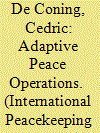

|
|
|
|
|
| Summary/Abstract |
Complexity theory offers a theoretical framework for analysing how social systems prevent, manage and recover from violent conflict. Insights from complexity suggest that for a peace process to become self-sustainable, resilient social institutions need to emerge from within, i.e. from the culture, history and socio-economic context of the relevant society. Peace operations are deployed to contain violence and to facilitate this process, but if they interfere too much, they will cause harm by inadvertently disrupting the very feedback loops critical for self-organization to emerge and to be sustained. To navigate this dilemma, the paper proposes employing an adaptive approach, where peace operations, together with the communities and people affected by the conflict, actively engage in an iterative process of inductive learning and adaptation. Adaptive Peace Operations is a normative and functional approach to peace operations that is aimed at navigating the complexity inherent in trying to nudge societal change processes towards sustaining peace, without causing harm.
|
|
|
|
|
|
|
|
|
|
|
|
|
|
|
|
| 2 |
ID:
106719
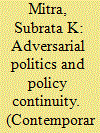

|
|
|
|
|
| Publication |
2011.
|
| Summary/Abstract |
The article seeks to explain the resilience of India's democracy in terms of the persistence of significant legislative output and policy continuity despite noisy adversarial politics. The article analyses this argument on the basis of a comparison of two different national regimes - one by the BJP-led National Democratic Alliance government (NDA), 1999-2004, and the other by the Congress-led United Progressive Alliance (UPA), 2004-2009. Despite their rather different approaches to citizenship - the former, based on Hindu nationalism, and the latter, a more inclusive, 'secular' conception of citizenship - there is considerable convergence in legislative regimes, institutions to safeguard the interest of minorities and public subsidy for the Haj pilgrimage. Turning subjects into citizens - no doubt with a sharp eye to their electoral potential - has become accepted practice by both competing coalitions. Despite its occasional breakdown, the paradoxical juxtaposition of adversarial politics and policy continuity is achieved because of the existence of a broad inter-party consensus on one coherent and meaningful citizenship regime and the high trust in which mediating institutions like the Supreme Court and the Election Commission are held.
|
|
|
|
|
|
|
|
|
|
|
|
|
|
|
|
| 3 |
ID:
145524
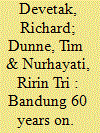

|
|
|
|
|
| Summary/Abstract |
This article examines the extent to which international society has been able to accommodate challenges such as the mid twentieth-century ‘revolt against the West’ and the twenty-first-century rise of new (especially non-Western) great powers. The Bandung conference of 1955 has commonly been seen as posing a threat to the fabric of international society by proliferating cultural and political differences. The authors show, on the contrary, that the political project of anti-colonialism and peaceful coexistence expressed at Bandung was actually consistent with a pluralist conception of international society, even if Western powers and intellectuals at the time failed to notice. The non-Western countries represented at Bandung were intent on expunging international society of the structures and practices of racism and colonialism so as to strengthen the foundations of a pluralistic international society better able to accommodate cultural and political differences.
|
|
|
|
|
|
|
|
|
|
|
|
|
|
|
|
| 4 |
ID:
174851
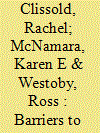

|
|
|
|
|
| Summary/Abstract |
Although adaptation to climate change is becoming increasingly recognised as an unavoidable priority, barriers are consistently encountered and reported. Identifying, analysing and overcoming these barriers is essential for ensuring that, as climate change worsens, adaptation capacities are not exceeded. Despite current studies providing a useful structuring heuristic to guide inquiry, there is a significant gap related to explanations around barrier occurrence and how to overcome them. In response, this article, based on semi‐structured stakeholder interviews, aims to provide preliminary insights into the type of barriers that exist in Laamu Atoll, the Maldives and explore any interdependencies between them. This study found that a range of resource barriers (i.e. funding, physical and human resources in outer islands and data on vulnerable groups) and social barriers (i.e. political/institutional and organisational constraints and inefficiencies, marginalisation and power differences as well as cognitive elements) were hampering adaptation. In exploring the interdependencies that exist between these barriers, the nature of their occurrence, persistence and entry points for resolution were also identified.
|
|
|
|
|
|
|
|
|
|
|
|
|
|
|
|
| 5 |
ID:
160874
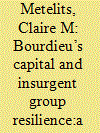

|
|
|
|
|
| Summary/Abstract |
The conflict between the rebel group, the Polisario Front, and the Kingdom of Morocco is nearing its 43rd year. Though under-reported, the conflict itself garners attention for the resilience – some would say tenacity – of the ethnically Sahrawi Polisario Front. Despite shifting regional and international politics and the nearly 150,000 Sahrawi refugees waiting in nearby Algerian camps, the rebel group has survived. What explains its resilience? This article uses Bourdieu’s ‘forms of capital’ to understand the Polisario Front’s persistence. Based on field research in Algeria, Western Sahara, and the United States, it finds that social, cultural, symbolic, and economic capital may provide an explanation.
|
|
|
|
|
|
|
|
|
|
|
|
|
|
|
|
| 6 |
ID:
109035
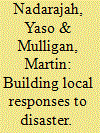

|
|
|
|
|
| Publication |
2011.
|
| Summary/Abstract |
While there has been much discussion in international disaster management literature in recent years of the need to give affected communities much more 'ownership' of recovery and rehabilitation pro-jects and programs, there is little real understanding of what this might mean in practice. There are many calls for post-disaster recovery programs to reduce vulnerability to future risks, or to 'build back better'. Drawing from an intense study of social recovery and community rebuilding across five tsunami-affected local areas in Sri Lanka and southern India, this article affirms the need for greater community 'guidance' of disaster recovery but it argues that different forms of community engagement are required for different stages in the long process from relief to recovery. It argues that 'build back better' is possible, but only if aid and other related agencies work more closely with existing capacities for resilience within the affected communities and contribute towards their legitimacy.
|
|
|
|
|
|
|
|
|
|
|
|
|
|
|
|
| 7 |
ID:
164157
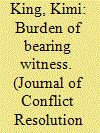

|
|
|
|
|
| Summary/Abstract |
Intersections exist regarding how institutions and individuals respond in the wake of mass violence, and we explore one theoretical perspective: resilience—the ability to overcome in the face of adversity. By controlling for the institutional context, we analyze the microlevel impact of testifying on witnesses who testify. New survey data provide information from 300 prosecution, defence, and Chambers witnesses who appeared at the International Criminal Tribunal for the Former Yugoslavia. We test propositions about resilience related to trauma, motivations, contributions to justice, fair treatment, witness fatigue, and human security. Witnesses who experienced greater trauma, who were more highly motivated, who believed they contributed to justice, and who were satisfied with their current situation were more positive about testifying. Those who believed they were treated fairly by prosecution and defence were less negative. The findings add to the debate about the burden of bearing witness in post-conflict societies and why some overcome adverse experiences related to mass violence.
|
|
|
|
|
|
|
|
|
|
|
|
|
|
|
|
| 8 |
ID:
185227
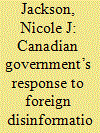

|
|
|
|
|
| Summary/Abstract |
In recent years, governments have considered how to respond to “disinformation.” However, there is little academic literature on Canada’s response in the area of security and foreign policy. This paper addresses this gap by analyzing how and why Canadian government foreign and security actors have “securitized” foreign disinformation. It argues that, since 2014, they have increased awareness about disinformation and transformed it into a matter of “security” through rhetoric and discursive framing, as well as stated policy intentions and actions. This has occurred in response to perceived threats, but without coherent policy. The findings suggest that challenges are linked to persistent difficulties in defining and understanding disinformation. The result has been fragmented actions, some of which may legitimate actions that deviate from “normal political processes.” The implications are that definitional challenges need to be addressed, the role of security actors assessed, and a clearly articulated and holistic strategy drawn.
|
|
|
|
|
|
|
|
|
|
|
|
|
|
|
|
| 9 |
ID:
117608
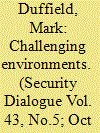

|
|
|
|
|
| Publication |
2012.
|
| Summary/Abstract |
Despite the widespread perception of danger, the aid industry continues to expand within challenging political environments. As a way of reducing risk, this expansion has been accompanied by the 'bunkerization' of international aid workers. While this development is largely viewed by the industry as an unfortunate response to a decline in external security, a more holistic approach is used here to explain the consequent paradox of liberal interventionism: an expansion that is simultaneously a remoteness of international aid workers from the societies in which they operate. The demise of modernist legal, moral and political constraints, together with a decline in the political patronage that aid agencies enjoy, has been important in shaping the new risk terrain. At the same time, these changes embody a profound change in the way contingency is approached. Earlier modernist forms of protection have been replaced by postmodernist calls for resilience and the acceptance of risk as an opportunity for enterprise and reinvention. Within the aid industry, however, field-security training represents a countervailing attempt to govern aid workers through anxiety. Resilience, in the form of 'care of the self' techniques, becomes a therapeutic response to the fears induced in this way. Viewed from this perspective, apart from reducing risk, the bunker has important therapeutic functions in a world that aid workers no longer understand or feel safe in.
|
|
|
|
|
|
|
|
|
|
|
|
|
|
|
|
| 10 |
ID:
138234
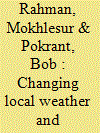

|
|
|
|
|
| Summary/Abstract |
Coastal Bangladesh is experiencing the effects of weather and climate-related stressors. The paper reports on the ways in which members of nine occupational groups in two coastal villages in South-west Bangladesh understand and respond differentially to recent changes in local weather and weather-related events and processes. Their understanding is grounded in local experiences and varied livelihood options, which are a complex interaction between people’s social and spatial locations and local weather and non-weather events and processes. Their priorities are to protect livelihoods through resilience-building actions, which address proximate causes of vulnerability (improving coastal embankments, rehabilitating and strengthening homesteads, protecting agricultural land). Government support is limited to traditional development interventions that assist some more than others and often disconnected from local people’s priorities. Most adaptation actions are practical measures within the prevailing politico-legal order. There is some evidence of more rights-based cooperative action between a national non-governmental organisation and local farmers that challenged aspects of that order.
|
|
|
|
|
|
|
|
|
|
|
|
|
|
|
|
| 11 |
ID:
151145
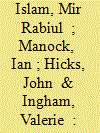

|
|
|
|
|
| Summary/Abstract |
Two million people were affected in the floodplains and low-lying areas in Sirajgang in 2012. Seven hundred and fifty families were made homeless and forced to live in small temporary huts on the river protection embankments. Unemployment rose alarmingly and the jobless left their villages to find work in larger cities, leaving behind their vulnerable and insecure families. Consequently, women were increasingly required to take on totally unfamiliar roles. Our research utilised in-depth interviews with women managing without the support of their husbands. Key findings highlighted that community resilience would improve if these women were engaged at the local operational level of disaster management.
|
|
|
|
|
|
|
|
|
|
|
|
|
|
|
|
| 12 |
ID:
110814
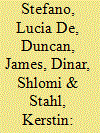

|
|
|
|
|
| Publication |
2012.
|
| Summary/Abstract |
In the existing 276 international river basins, the increase in water variability projected by most climate change scenarios may present serious challenges to riparian states. This research maps the institutional resilience to water variability in transboundary basins and combines it with both historic and projected variability regimes, with the objective of identifying areas at potential risk of future hydropolitical tension. To do so, it combs existing international treaties for sources of institutional resilience and considers the coefficient of variation of runoff as a measure of past and future water variability. The study finds significant gaps in both the number of people and area covered by institutional stipulations to deal with variability in South America and Asia. At present, high potential risk for hydropolitical tensions associated with water variability is identified in 24 transboundary basins and seems to be concentrated mainly in northern and sub-Saharan Africa. By 2050, areas at greatest potential risk are more spatially dispersed and can be found in 61 international basins, and some of the potentially large impacts of climate change are projected to occur away from those areas currently under scrutiny. Understanding when and where to target capacity-building in transboundary river basins for greater resilience to change is critical. This study represents a step toward facilitating these efforts and informing further qualitative and quantitative research into the relationship between climate change, hydrological variability regimes, and institutional capacity for accommodating variability.
|
|
|
|
|
|
|
|
|
|
|
|
|
|
|
|
| 13 |
ID:
190181
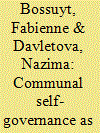

|
|
|
|
|
| Summary/Abstract |
In the European Union’s (EU) new Strategy for Central Asia, which was launched in May 2019, boosting the resilience of Central Asian societies is singled out as a key priority. Drawing on post-development thinking, this article argues that if the EU is serious about promoting resilience to empower ‘the local’ and contribute towards a truly sustainable future for the societies of Central Asian countries, then the EU will need to embrace a de-centred, post-neoliberal approach to resilience. This implies that the EU would have to accept ‘the other’ – in this case, the Central Asian societies – for what they are and advocate home-grown self-organization based on a deep understanding of the local meaning of good life and local knowledge about the available resources. Empirical illustrations to substantiate this claim are drawn from a concrete case, namely the mahalla in Uzbekistan.
|
|
|
|
|
|
|
|
|
|
|
|
|
|
|
|
| 14 |
ID:
150722
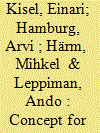

|
|
|
|
|
| Summary/Abstract |
The following paper presents a discussion of short- and long-term energy security assessment methods and indicators. The aim of the current paper is to describe diversity of approaches to energy security, to structure energy security indicators used by different institutions and papers, and to discuss several indicators that also play important role in the design of energy policy of a state. Based on this analysis the paper presents a novel Energy Security Matrix that structures relevant energy security indicators from the aspects of Technical Resilience and Vulnerability, Economic Dependence and Political Affectability for electricity, heat and transport fuel sectors. Earlier publications by different authors have presented energy security assessment methodologies that use publicly available indicators from different databases. Current paper challenges viability of some of these indicators and introduces new indicators that would deliver stronger energy security policy assessments. Energy Security Matrix and its indicators are based on experiences that the authors have gathered as high-level energy policymakers in Estonia, where all different aspects of energy security can be observed.
|
|
|
|
|
|
|
|
|
|
|
|
|
|
|
|
| 15 |
ID:
193485
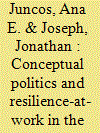

|
|
|
|
|
| Summary/Abstract |
International crises, most recently the Covid-19 pandemic and Russia’s invasion of Ukraine, often radically change our view of the world and our place within it. The European Union (EU) has been particularly impacted by these developments because these crises have accentuated some of its ontological and epistemological uncertainties and insecurities. While the EU’s resilience turn initiated by the EU Global Strategy of 2016 aimed at strengthening the EU’s ability to prepare and recover from external shocks and crises, since then, the concept of resilience has undergone a transformation. In recent years, we have seen the EU turning back in on itself and abandoning the radical aspects of resilience. Hence a paradox has emerged – the more complex the problems faced by the EU, the more it turns away from the logics of complexity present in the idea of resilience. In this article, we examine this conceptual shift through the lenses of concepts in action and the way these have reflected changes in the external context, but also power coalitions and institutional path dependencies. This argument will be explored by examining the recently adopted Strategic Compass and the EU’s Recovery and Resilience Facility (RRF).
|
|
|
|
|
|
|
|
|
|
|
|
|
|
|
|
| 16 |
ID:
180208


|
|
|
|
|
| Summary/Abstract |
Contemporary liberal and democratic states have ‘securitized’ a growing number of issues by advancing the notion of societal security. This is coupled with a proactive stance and the conception of building societal resilience in order to withstand future crises and disturbances. The preemptive logic of contemporary security and crisis management calls for a new type of resilient neoliberal subject who is willing to accept uncertainty and shoulder greater individual responsibility for her own security. This article offers a genealogical analysis of this development in Sweden since the end of the Cold War, highlighting the role now assigned to citizens within social and national security planning. I argue that seeking a return to a more traditional notion of ‘total defence’ blurs the previously important war/peace and crisis/security distinctions. While war preparedness in previous eras was an exceptional aspect of human life and citizenship, the conceptions of security now evolving bind together societal and national security such that civil and war preparedness are merged into an ever-present dimension of everyday existence. The analysis also reveals that the responsibilization of individuals introduces a moral dimension into security and generates new forms of citizen–citizen relations. These extricate the sovereign powers of the state and the liberalist social contract between the state and its citizens.
|
|
|
|
|
|
|
|
|
|
|
|
|
|
|
|
| 17 |
ID:
160620
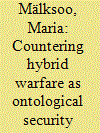

|
|
|
|
|
| Summary/Abstract |
What are the ethical pitfalls of countering hybrid warfare? This article proposes an ontological security-inspired reading of the EU and NATO’s engagement with hybrid threats. It illustrates how hybrid threat management collapses their daily security struggles into ontological security management exercise. This has major consequences for defining the threshold of an Article 5 attack and the related response for NATO, and the maintenance of a particular symbolic order and identity narrative for the EU. The institutionalisation of hybrid threat counteraction emerges as a routinisation strategy to cope with the “known unknowns”. Fostering resilience points at the problematic prospect of compromising the fuzzy distinction between politics and war: the logic of hybrid conflicts presumes that all politics could be reduced to a potential build-up phase for a full-blown confrontation. Efficient hybrid threat management faces the central paradox of militant democracy whereby the very attempt to defend democracy might harm it.
|
|
|
|
|
|
|
|
|
|
|
|
|
|
|
|
| 18 |
ID:
186655
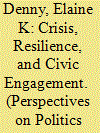

|
|
|
|
|
| Summary/Abstract |
How do economic shocks and financial resilience shape civic engagement, especially for the economically insecure? I turn to the early months of the coronavirus pandemic for insights. In April 2020, with more than 23 million adults unemployed, the US government asked residents to participate in the constitutionally mandated decennial census. I test how variations in income shocks from the shutdown and sources of financial resilience predict disparities in census completion, a civic act designed to minimize participation barriers. First, I use nationally representative survey data to demonstrate that policies that protect the economically vulnerable from the full impacts of economic shocks also predict higher census completion rates. Then, I use Google Trends data to show that high unemployment search volume interacted with low resilience to predict depressed census completion. Findings shed light on how economic crises can widen participation gaps—with representation and resource consequences—and how policies that lessen acute economic shocks may reduce participation disparities.
|
|
|
|
|
|
|
|
|
|
|
|
|
|
|
|
| 19 |
ID:
158474
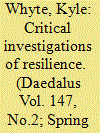

|
|
|
|
|
| Summary/Abstract |
Indigenous peoples are among the most active environmentalists in the world, working through advocacy, educational programs, and research. The emerging field of Indigenous Environmental Studies and Sciences (iess) is distinctive, investigating social resilience to environmental change through the research lens of how moral relationships are organized in societies. Examples of iess research across three moral relationships are discussed here: responsibility, spirituality, and justice. iess develops insights on resilience that can support Indigenous peoples' struggles with environmental justice and political reconciliation; makes significant contributions to global discussions about the relationship between human behavior and the environment; and speaks directly to Indigenous liberation as well as justice issues impacting everyone.
|
|
|
|
|
|
|
|
|
|
|
|
|
|
|
|
| 20 |
ID:
120000
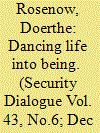

|
|
|
|
|
| Publication |
2013.
|
| Summary/Abstract |
A variety of scholars in critical security studies have recently argued that new modes of neoliberal world order are influenced by the emergence of complexity theory in the sciences, which manifests itself, for example, in the discourse of resilience. By contrast, this article aims to point at the number of governmental discourses and practices in which 'old' understandings of order are persistent. What will be argued is that such a set of practices can be found in the regulation of genetically modified organisms (GMOs), in which the dominant approaches and strategies still rely on an understanding of life that is bound to a more traditional episteme that expresses the desire for predictable management with clearly controllable effects. The article then moves on to discourses of resilience to show how they are equally characterized by this episteme. In unravelling the struggle that exists between 'old' and 'new' epistemes, the article aims to elaborate on the potential of complexity discourses for challenging particular governmental rationales, manifested in both the resilience context and the GMO controversy.
|
|
|
|
|
|
|
|
|
|
|
|
|
|
|
|
|
|
|
|
|